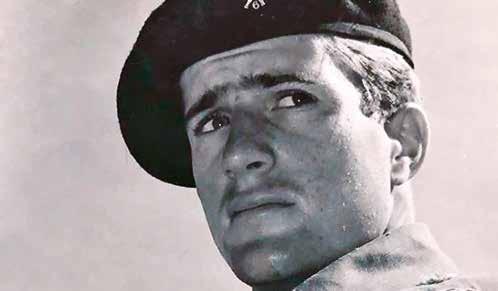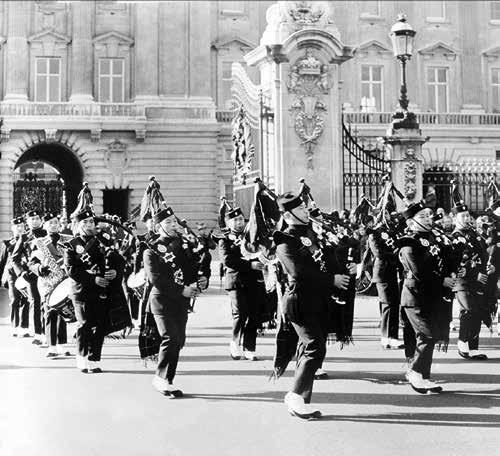
5 minute read
Obituaries
from 6 GR Journal 100
OBITUARIES 6 GRRA DEATHS AND OBITUARIES
With great sadness the Association notes the deaths of the following members since the last issue of The Journal. SLIM Colonel 2nd Viscount John, OBE, DL, who died on 12 January 2019. STONE Mrs Jean, widow of the late Lt Colonel Geoff Stone, who died on 3 June 2019.
2ND VISCOUNT JOHN SLIM obe, dl
Viscount Slim in 1945 in Japan
As a teenager John Slim spent his school holidays with his father. This might not seem so unusual, until it is noted that his father was the wartime commander of the 14th Army and that the “holidays” were taken near the front lines in India and Burma. There the 16-yearold witnessed the gruelling fighting endured by what became known as the “forgotten army”, as well as its ultimate victory over the Japanese.
Unsurprisingly, as soon as he was old enough, the gung-ho young Slim joined his father’s regiment, the
6th Gurkha Rifles. Cutting a swashbuckling figure, square of jaw and bushy of eyebrow, he served as a supernumerary aide-de-camp to his father’s friend Major-General “Punch” Cowan in the final months of the war in the Far East — months in which his father came to be regarded as a national hero.
Just as unsurprisingly, this made a deep impression on him. As a 19-year-old subaltern in what was by then an army of occupation, Slim toured the ruins of Hiroshima and Nagasaki by motorbike. This could be attributed to youthful curiosity, but it also indicated the restlessness
of a man on a quest to make a name for himself, and, perhaps, escape from the shadow of his father.
John Douglas Slim was born in Quetta, now in Pakistan, in 1927. He was the only son of the then Captain William “Bill” Slim and his wife, Aileen (née Robertson). He enjoyed his childhood in India, describing himself as a “cantonment brat” and remembering a life of vast landscapes, personal freedom and the warmth and privilege of an affectionate household with cooks and servants, picnics and polo. He attended the Rashtriya Indian Military College at Dehradun, where he became fluent in Urdu.
After the war, on return to Burma from Japan, he commanded a platoon of the 6th Gurkhas for 18 months during the tense period of political manoeuvrings that led to the country’s independence outside the Commonwealth in 1948. In that year he was treated in hospital for dysentery and advised against continued service in Asia. He moved to Scotland to secure a regular commission with the Argyll and Sutherland Highlanders.
Slim went to Korea with the 1st Argylls in 1950 and was regularly engaged in action over the ensuing months, including the advance on Songju in late September after the breakout from the Pusan bridgehead. On his return to Scotland he met Elisabeth Spinney, known as “Buffy”, and they were married in 1958. When she was with her husband in Aden and Cyprus in the 1960s she kept a pistol in her bag and was renowned as the fastest draw from a handbag. They had three children: Mark, who is now the Third Viscount, and Chairman of trustees of the Burma Star Association, Hugo and Mary Ann.
The Far East continued to beckon and Slim applied to join the Malayan Scouts, who were to be reorganised as the 22nd Special Air Service (SAS) Regiment. He was selected and became involved in the pioneering of techniques for parachuting into dense jungle. After this he commanded an SAS squadron and was in East Malaysia in 1965 during Indonesia’s ill-judged confrontation with Malaysia. He then moved to South Arabia, where elements of the regiment were deployed until the end of the British presence there in 1967. Appointed to command 22 SAS that year, he turned his attention to worldwide counterinsurgency operations.
After completing his command of 22 SAS, he was appointed OBE and left the army as a Colonel to start a new career in business. His working life became divided between associations and charities with which his father’s name was inevitably linked, and after the initial reform of the House of Lords, he became an elected hereditary member and attended the House regularly. He spoke well without notes and his views on defence, security and veterans were respected.
As the 2nd Viscount Slim, a title he inherited in 1970, he kept alive the memory of the 14th Army as president of the Burma Star Association and this will be his most enduring memorial. He put his heart into the interests of the steadily dwindling number of survivors of the gruelling Burma campaigns and the widows of those who died in the conflict. No one wearing the coveted campaign star ever failed to win his attention.
In his work for the SAS Regimental Association, as president from 2000 to 2011 and patron until his death, he was equally assiduous for the welfare of veterans and their families. He also represented the interests and achievements of the regiment in the Lords and in any debate on its history or future.
In the end he may not have entirely avoided the long shadow of his father, but his military achievements could be judged on their own merit. He was always, to everyone, good company, and though he boomed like a foghorn, he was ironically aware of his own theatre.
Colonel John Slim, 2nd Viscount Slim, OBE, DL, was born on July 20, 1927. He died on January 12, 2019, aged 91.
An abbreviated copy of The Times obituary dated 15 January 2019
John Anderson writes:
Like many of 6 GR, the Slim family touched my life. I resigned from the Rhodesian Army when Ian Smith made the Unilateral Declaration of Independence on 11 November 1965, and I was suddenly stateless, jobless and stuck in the UK. I had no inclination to join a “British” regiment. However, I was then told that Field Marshal Slim was prepared to offer me a commission in his old Regiment, 1/6 GR, which I hastened to accept; I still treasure the personal letter from him. Sadly, I had the honour of commanding the Gurkha Contingent at his funeral on 22 I first met his son, John, in 1969 while I was ADC to
December 1970. MGBG in Malaya. John was commanding 22 SAS and we visited them in Northern Malaya while they were “on exercise”; he was delighted to see my 6 GR shoulder-titles and years later recalled this first meeting. I was very privileged when he asked me, the year before he died, to read the ‘Prayer for the Gurkha’ at his Memorial Service, which he had meticulously planned in advance. We all said farewell to this lovely man at this Service on 16 May 2019: it was the Regimental Birthday of both his and his father’s Regiment, 6 GR.
6 GR Pipes and Drums at Buckingham Palace after Royal Pipe Banner presentations 1962











